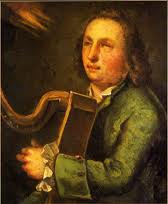Annotation:Lady Laetitia Burke: Difference between revisions
No edit summary |
No edit summary |
||
| Line 13: | Line 13: | ||
<br> | <br> | ||
<br> | <br> | ||
[[File:carolan.jpg|200px|thumb|left|Turlough O'Carolan]] | [[File:carolan.jpg|200px|thumb|left|Turlough O'Carolan]] | ||
O'Sullivan (1958) identifies the subject as Lady Laetitia Burke, the eldest daughter of the 9th Earl of Clanricard and his wife Bridget, daughter of James Talbot, Templeogue, County Dublin. She married [[Sir Festus Burke]], the subject of another of O'Carolan's pieces, around 1708. She died in June, 1740. Laetitia's father had come out for King James and was captured at the Battle of Aughrim, and, although his life was spared his lands and title were forfeited. When Queen Anne came to the throne he petitioned to be reinstated, and, since he had converted to Protestantism in 1699, his request was eventually granted. Carolan composed airs for many members of the rather large Burke family (eleven sons and six daughters born, of whom five sons and four daughters survived his death in 1722). | O'Sullivan (1958) identifies the subject as Lady Laetitia Burke, the eldest daughter of the 9th Earl of Clanricard and his wife Bridget, daughter of James Talbot, Templeogue, County Dublin. She married [[Sir Festus Burke]], the subject of another of O'Carolan's pieces, around 1708. She died in June, 1740. Laetitia's father had come out for King James and was captured at the Battle of Aughrim, and, although his life was spared his lands and title were forfeited. When Queen Anne came to the throne he petitioned to be reinstated, and, since he had converted to Protestantism in 1699, his request was eventually granted. Carolan composed airs for many members of the rather large Burke family (eleven sons and six daughters born, of whom five sons and four daughters survived his death in 1722). | ||
<br> | <br> | ||
Latest revision as of 18:52, 26 June 2019
X: 1 T:Lady Laetitia Burke C:O'Carolan B:CWTO.010 F:file ID carolan/079llb Z:Gilb/Brennan/Black N:I have raised mm 13-14 an octave. M:2/4 Q:70 L:1/16 K:C "LARGHETTO" cBcd c2G2|cdef e2dc|cBAG A2GE|G4G4| "5"C2cB A2G2|A2B2 c2d2|e2A2 d2cB|c4C4:| % "9"e2ee A2A2|G2GG E2E2|F2FF D2D2|G4G,4| "13"cdcB F2A2|G2c2 Bcd2|E2G2 AGFE|FEDC C4:| % "17"edef e2d2|c2d2 e4|edcB dcBA|e2E2 A4| "21"A2GE F2E2|D2C2 E2G2|B2cd G2d2|e2dc c4:|
LADY LAETITIA BURKE. AKA – "Lady Letty Burke." Irish, Planxty (2/4 time). C Major. Standard tuning (fiddle). AABBCC. Composed by Turlough O'Carolan. Recorded by the Belfast Northern Star of July 15th, 1792 (as "Lady Latitia"), as having been played by one of ten Irish harp masters at the last great convocation of ancient Irish harpers, the Belfast Harp Festival, held that week.

O'Sullivan (1958) identifies the subject as Lady Laetitia Burke, the eldest daughter of the 9th Earl of Clanricard and his wife Bridget, daughter of James Talbot, Templeogue, County Dublin. She married Sir Festus Burke, the subject of another of O'Carolan's pieces, around 1708. She died in June, 1740. Laetitia's father had come out for King James and was captured at the Battle of Aughrim, and, although his life was spared his lands and title were forfeited. When Queen Anne came to the throne he petitioned to be reinstated, and, since he had converted to Protestantism in 1699, his request was eventually granted. Carolan composed airs for many members of the rather large Burke family (eleven sons and six daughters born, of whom five sons and four daughters survived his death in 1722).
